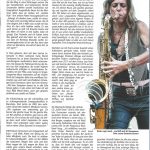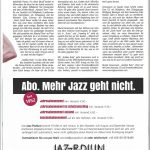with thanks for the great photos to FRANCISCO MIRO MOLL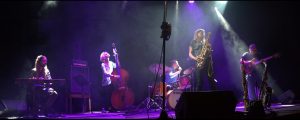
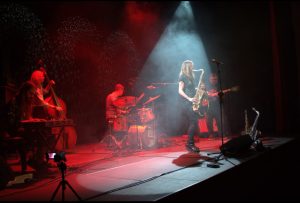
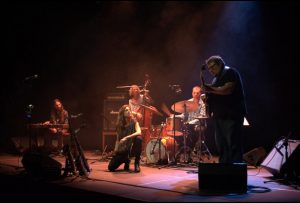
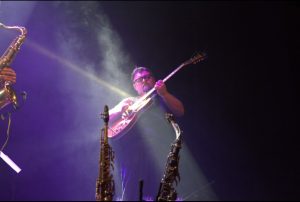
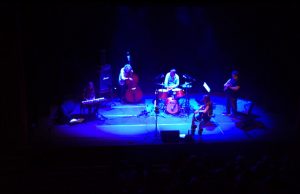
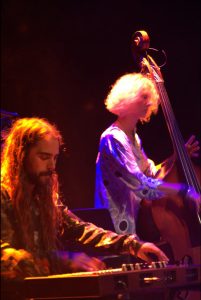
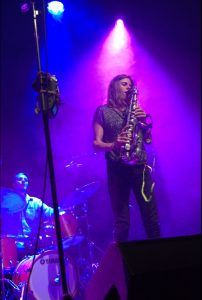
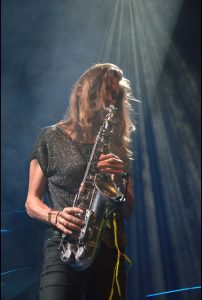
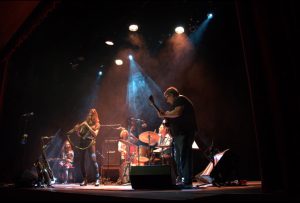 ⇐ back to news page
⇐ back to news page
⇐ back to concerts page
⇐ back to photos page
⇐ back to Muriel Grossmann Quintet page
Autor: Muriel Grossmann
Portrait in Jazzpodium by Thorsten Meyer, Feb 2019
PORTRAIT by Thorsten Meyer for JAZZ PODIUM, Germany, Februar 2019
Sometimes it is coincidences and moods that point the way in new directions. For the saxophonist and composer Muriel Grossmann, it was both musical and biographical moments that paved the way for her release of her tenth record “Golden Rule”: “As long as I can remember, I wanted to travel, and I have done it since I could do it myself, by car or motorcycle. Since then I’ve always been on the road. I knew just about where I wanted to go and then the way was leading me. Then once, when I was again in Vienna for a longer time, I realized that I did not want to stay there. It was always too cold. I need sun and the sea. I said, “That’s it! I drive south. “A friend and I bought a bus and then we went. I only knew that I wanted to go to Morocco. But the bus collapsed before in Barcelona. Then I was stuck from one day to another — and it was great! ”
Born in Paris, but living in Vienna since the age of 4, Muriel Grossmann undertook an intricate musical journey until that Barcelona trip. The father’s classical record collection provided early inspiration, the first steps were made in different ensembles with the flute, the first own songs in the singer-songwriter idiom were written on the guitar. But there was more. The saxophone exerted an insatiable fascination, and after various detours Grossmann then found her voice there: “With the saxophone you can play all styles. At first I played a lot of soul, R & B, world music, also jazz. I could try a lot, played to a lot of records. Then it was clear. ”
Muriel Grossmann’s CD releases are an evolutionary story. The roots of the various CDs are developments of previous recordings. The initial spark was the involuntary, and then so pioneering forced stay in Barcelona. There she met the Serbian guitarist Radomir Milojkovic in 2002: “We complement each other insanely. There is the same fire for the same music. It’s great fun to play live together. We have a passion for working on pieces, no matter what style it is. What he then brought to my music is that there is one who carries me. I can do it the way it should be. It’s also rare to find someone who says, “Your music, wow. I want to work with you on it. “I get inspiration for my music immediately. I keep developing his idea, and he mine. This dynamic is amazing. ”
The two played in lot of different contexts. In 2003 Grossmann then went to Ibiza to know the island and immediately got into the scene there and decided to move there and Radomir caught up with her there in 2006. The island has been their center of life ever since. “Ibiza is the Mecca of inspiration for me. Because of the light and the sea, the air, because of the nature. I would write completely different music if I had stayed in Vienna. I could not have developed this music like that there. My music is very connected with nature. Listening to my music with headphones makes you feel like you really hear nature. It is pulsating. There is life in it. ”
In Ibiza she entered the scene right from the beginning, and met another famous jazz musician who set up his domicile there: Joachim Kühn: “When I first came to the island, I came to a session where there were 20- 30 musicians. It was a small room, all playing simultaneously, and Joachim on the saxophone right in the middle. I know him a lot on the saxophone because he always came with it to the sessions and we played together. We then became friends, and I was often at his house. We then listened through his incredible record collection, and of course through his own records. He did over 300. He has a story to tell about every musician because he almost met everyone. Either playing, or in the neighboring studio, or on festivals. And besides, he is such an intense person that he also has intense stories. That was certainly my biggest musical influence. His harmonic system also totally influenced me. In the time when I played avant-garde, you have to imagine it as if everything around me had exploded. A complete reorientation. And that’s how I started writing intensively, of course. ”
After making recordings with her first quartet, Grossmann got in touch with other musicians through Joachim Kühn: drummer Christian Lillinger and double bassist Robert Landfermann.
They played together at the Eivissa Jazz Festival in 2011 and released the 2013 recording on the CD “Awakening”. A programmatic title, because the recording and its consequences triggered something, which drew its circles until the new CD “Golden Rule”: “The encounter with Joachim first made my standards freer. And then it went right into the avant-garde, and I came to musicians like Christian Lillinger and Robert Landfermann. That’s when I took a different turn, and that came from engaging in this meditation. That was at the time of “Awakening”. The influence of spiritual jazz already is audible.”
The central landmark was the next CD “Earth Tones” (2015). Here Grossmann worked for the first time with very special drones as scaffolding and at the same time inspiration for the musical events. During a winter in a house in the mountains, surrounded by a lot of forest and little civilization, a gong-CD was played late at night. The idea for the Drones was born: “There is an idea behind it what I want to write about. This idea comes from the fact that I reflect a lot on different things. Some are inward, some outward. With “Earth Tones” I thought I needed a message for the people that we all help together and take care of the earth. And so the respective album is created immediately. It is not that I write this today and that tomorrow, but the concept is created in a very short time, usually in one day. At “Earth Tones” I first recorded these drones, linearly. Not per piece, but per album. I started with the tambura as a base. The concept was that I wanted to write something for the Earth, and supposedly Earth has the tone of C Sharp/D Flat. Of course, I can not verify that (laughs), but then I took that and wrote a overtone-tone series where I changed just one tone, and assigned the pieces to it. Therefore, the pieces also all have a gradual change in pitch. That’s always very important to me. It’s like a scale swinging in the background of the suite. If you listen to the album from start to finish, it’s a big scale. So I knew in which keys I wanted to write the pieces. I then played all the pieces with the tambura first. Now, of course, a dynamic came out, which started quietly, slowly increased and finally dropped again. And then I took the next instrument, and then the next, and so on. Then I had all my drones and took my saxophone and played with it. From front to back. And then Rade made the guitar drones, and then Christian and Robert later played on it. ”
Each CD can be understood as a suite. The individual pieces always fit under an overall arc and a resonant content theme. For this music, it requires co-musicians who support this way of playing and working 100%, and besides Milojkovic, Grossmann has chosen since the 2016 album “Natural Time” for this quartet Milojkovics compatriot Uros Stamenkovic on drums and Grossmanns Vienna colleague Gina Schwarz on bass. “After “Earth Tones” I wanted to write something that had this meditative idea, but also swing, and Radomir then told me to call Uros. They have known each other for a very long time. For me he is my Elvin Jones (laughs). He is a great drummer. Of course we also had opportunities to grow together. At first we went on tour with “Natural Time”. And then he’s here for three months every summer. I just brought Gina because I always wanted to do something with her. She is a monument! What a forcé she has! And her phrasing is always “Jazz”. We do not need to talk much about that. She always played as I like it anyway. Although she otherwise plays very different music too. But she has such a Groove, such strong fingers! It’s not so easy with this music, where you have to play 15 minutes through. ”
“Golden Rule” is the third CD of the current quartet, and here the drone principle, as already on the predecessor “Momentum” (2017) is integrated in another way: “The Drones come out of the play. Since then I have heard the pieces after recording and then I know what I want to have on each one. First and foremost, the sounds are important. I keep these drones more or less secret, in their composition. The listener can get curious what instruments are played, or even suddenly perceive something. On “Momentum” there are e.g superimposed double basses. In “Golden Rule” Marimba, Kalimba, it is also more in the African direction. That’s how I can play with the harmonies. I give the quartet these harmonic sound sheets. That’s something from Coltrane. The song gets thereby a modal carpet. In the accompanyment, I can use then different tones, and like this a sound spectrum unfolds. ”
Muriel Grossmann does not want to deny the influence of John and Alice Coltrane, on the contrary: In “Trane” and Traneing in “she explicitly takes the hat off of the two. “Although I always had the feeling that this development came out of me, Coltrane’s music has always given me so much, and I wanted to say thank you, a thank you for what he gave me in life. ”
With “Golden Rule”, Muriel Grossmann goes a step further in terms of the publicity of her music. Since 2007 she has been releasing her CDs on her own label ‘Dreamland Records’. She appreciates the maximum artistic freedom, both in terms of music and the layout of the CDs, which so far have all been decorated with pictures of her and her children. For “Golden Rule” there opened a new perspective. The vinyl label ‘RR Gems Records’ released a double LP with a different layout two months before the CD reléase, with an alienated cover photo a Little orientated towards Coltranes Impulse! Vinyls, very suitable for the dense and multi-faceted music of “Golden Rule”.
But Muriel Grossmann is already one step ahead. Another quartet album with drummer Wolfgang Reisinger and bassist Peter Herbert will be available for release in 2019, and the next album with her quartet is already recorded:
“This will be the apotheosis of everything that was mentioned before, and it will definitely put everything in the right perspective and give meaning to the whole story. It’s just a continuity since “Earth Tones”. There, everything was dedicated to the earth to raise our awareness of our environment. “Natural Time” then says, “Find your own rhythm, your talent and pass it on to the world. What you have is valuable, and it should be geared toward helping others. “Momentum” is the sequel to this: ‘What would happen if everyone does that? Which momentum arises then? There are the good tendencies all over, but they mus trise over the critical mass. “Golden Rule” is about what you need to achieve this tilting. It is not without this principle: “Think / Say / Do only what you also would like to receive from otheres!” You have to see it from the inside out. ”
The exiting story of Muriel Grossmann will be continued.
Thorsten Meyer
News
8.1.2016 — 20.1.2016 NATURAL TIME PRESENTATION TOUR
1.1.2016 out now! Natural Time on Cd
with Radomir Milojkovic on guitar, Gina Schwarz on bass and Uros Stamenkovic on drums


